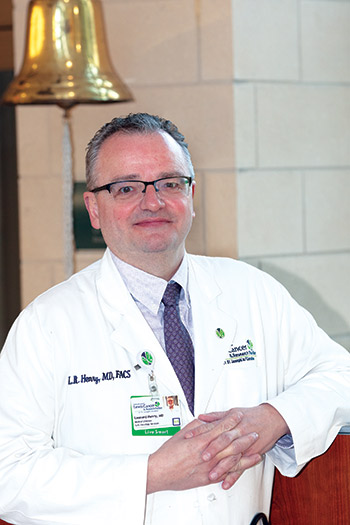Tomorrow’s Treatments Today
How clinical trials benefit patients locally and globally
Advances in medical oncology have led to incredibly effective classes of drugs that inhibit cancer cell growth. One example is the class known as CDK4/6 inhibitors. Working in conjunction with hormone therapy, CDK4/6 inhibitors block the signal that stimulates the growth of cancer cells in certain types of breast cancer, helping older patients with metastatic breast cancer live longer, healthier lives.
But these drugs can also have side effects, which for some patients can be severe. Debilitating fatigue, gastrointestinal issues and an increased risk of infection are some of the most common side effects of this class of drugs, and they can be severe enough that patients just don’t want to take them anymore.
Common issues such as these have many physicians asking, “Is there another way? A better way?”
The answers can be found in the cumulative data of clinical trials.
Providing An Opportunity

A clinical trial is a research study that allows patients to volunteer to receive treatments with a new drug or device, or with a new medical approach.
“Many of the trials we have here compare a standard treatment to a treatment that has a well-vetted expectation of being better for patients,” explains Leonard Henry, MD, medical director for the Nancy N. and J.C. Lewis Cancer & Research Pavilion (LCRP). “So, essentially, we are looking at tomorrow’s treatments today. And this gives certain patients an opportunity to participate in that.”
St. Joseph’s/Candler has access to some of the latest cancer trials because of its selection as a National Cancer Institute Community Oncology Research Program (NCORP).
“We have a unique position here because of our NCORP status,” Dr. Henry says.
More Than One Person’s Cancer Story
Clinical trials are reviewed and monitored by Institutional Review Boards that oversee the safety of its participants. The process also ensures that patients understands the risks and benefits of a potential trial. Despite this rigorous oversight, there is still a lingering perception of clinical trials as a place where patients become mere test subjects.
“People sometimes worry about the idea of being treated like a guinea pig,” Dr. Henry says. “But that’s not the case with modern clinical trials, and certainly never the case with our studies.”
In fact, participants in clinical trials receive close monitoring and care from a team of engaged medical professionals who help make each visit as comfortable and convenient as possible. And since many of the drugs or treatment plans have the expectation of improved outcomes, participants may be the earliest beneficiaries of that new treatment.
“Many patients really value being able to contribute to cancer care through their participation in a trial,” Dr. Henry says. “There is an altruistic aspect of knowing that you might also help someone down the line.”
The patients being helped in the future may be local or could live in a different state or even a different country. Many trials are open at multiple cancer centers, and data is uploaded to a central source with the trial’s principal investigators.
“These trials can give physicians around the world the answers they are looking for,” Dr. Henry says. “That’s another reason that many patients choose to participate. They don’t want their cancer story to be just their cancer story. They want to be impactful. And the opportunities are here in Savannah and the Lowcountry. The LCRP has nearly 50 open trials right now of many different types, with a fully-staffed research division. We are built for this.”
Earlier this year, the American Society of Clinical Oncology launched the CDK4/6 Inhibitor Dosing Knowledge (CDK) Study. Three St. Joseph’s/Candler locations were among the first sites in the country to enroll patients: the Nancy N. and J.C. Lewis Cancer & Research Pavilion in Savannah and St. Joseph’s/Candler SC Cancer Specialists in Bluffton and Hilton Head Island, South Carolina.
The study investigates personalized dosing strategies for CDK4/6 inhibitors in older adults with metastatic breast cancer. These patients often face challenges with treatment tolerability. This trial aims to explore how personalized dosing regimens can improve outcomes and quality of life.
To learn more about the CDK study, call 912-819-5723 or visit www.sjchs.org/CDK.